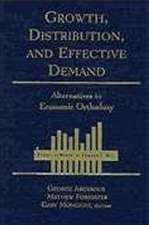Greek Capitalism in Crisis: Marxist Analyses: Routledge Frontiers of Political Economy
Editat de Stavros Mavroudeasen Limba Engleză Paperback – 11 noi 2016
The heterodox side of these debates has been occupied by Radical Political Economy approaches (usually radical post-Keynesian or Marxo-Keynesian perspectives). Moreover, they are dominated by the ‘financialisation’ thesis which is quite alien to Marxism, neglects the sphere of production and professes that the global crisis is simply a financial crisis that has nothing to do with ‘real’ accumulation and the profit rate.
This book argues that by emphasising the sphere of production and profitability, classical Marxist analysis better explains the Greek crisis than its orthodox and heterodox competitors. The contributors present critiques of the prevalent approaches and offer studies of the Greek crisis that use the methodology and the analytical and empirical tools of classical Marxist Political Economy. In particular, it is shown that the Greek crisis was caused by falling profitability and the ensuing overaccumulation crisis. The ‘broad unequal exchange’ existing between the euro-center and the euro-periphery contributed to Greek capital’s falling profitability. This book enriches the debate about the Greek economic crisis by demonstrating the insights that can be drawn by considering the Marxist alternative to the dominant mainstream and heterodox approaches.
| Toate formatele și edițiile | Preț | Express |
|---|---|---|
| Paperback (1) | 338.33 lei 6-8 săpt. | |
| Taylor & Francis – 11 noi 2016 | 338.33 lei 6-8 săpt. | |
| Hardback (1) | 848.55 lei 6-8 săpt. | |
| Taylor & Francis – 8 iul 2014 | 848.55 lei 6-8 săpt. |
Din seria Routledge Frontiers of Political Economy
-
 Preț: 309.90 lei
Preț: 309.90 lei -
 Preț: 309.79 lei
Preț: 309.79 lei -
 Preț: 316.03 lei
Preț: 316.03 lei -
 Preț: 310.95 lei
Preț: 310.95 lei - 9%
 Preț: 866.82 lei
Preț: 866.82 lei -
 Preț: 309.12 lei
Preț: 309.12 lei -
 Preț: 311.61 lei
Preț: 311.61 lei -
 Preț: 286.99 lei
Preț: 286.99 lei -
 Preț: 327.83 lei
Preț: 327.83 lei -
 Preț: 311.87 lei
Preț: 311.87 lei -
 Preț: 302.76 lei
Preț: 302.76 lei - 9%
 Preț: 938.48 lei
Preț: 938.48 lei -
 Preț: 152.67 lei
Preț: 152.67 lei -
 Preț: 151.97 lei
Preț: 151.97 lei -
 Preț: 318.54 lei
Preț: 318.54 lei -
 Preț: 317.95 lei
Preț: 317.95 lei -
 Preț: 310.01 lei
Preț: 310.01 lei -
 Preț: 326.49 lei
Preț: 326.49 lei -
 Preț: 155.44 lei
Preț: 155.44 lei -
 Preț: 309.79 lei
Preț: 309.79 lei -
 Preț: 328.76 lei
Preț: 328.76 lei -
 Preț: 281.72 lei
Preț: 281.72 lei -
 Preț: 286.58 lei
Preț: 286.58 lei -
 Preț: 386.12 lei
Preț: 386.12 lei -
 Preț: 353.78 lei
Preț: 353.78 lei -
 Preț: 325.09 lei
Preț: 325.09 lei -
 Preț: 310.55 lei
Preț: 310.55 lei -
 Preț: 387.03 lei
Preț: 387.03 lei -
 Preț: 324.87 lei
Preț: 324.87 lei -
 Preț: 312.86 lei
Preț: 312.86 lei -
 Preț: 374.16 lei
Preț: 374.16 lei -
 Preț: 329.09 lei
Preț: 329.09 lei -
 Preț: 348.22 lei
Preț: 348.22 lei - 28%
 Preț: 1047.06 lei
Preț: 1047.06 lei - 18%
 Preț: 1169.45 lei
Preț: 1169.45 lei - 18%
 Preț: 1555.17 lei
Preț: 1555.17 lei - 18%
 Preț: 1048.43 lei
Preț: 1048.43 lei - 18%
 Preț: 1059.84 lei
Preț: 1059.84 lei - 31%
 Preț: 767.47 lei
Preț: 767.47 lei - 18%
 Preț: 731.92 lei
Preț: 731.92 lei - 28%
 Preț: 822.54 lei
Preț: 822.54 lei - 18%
 Preț: 1796.21 lei
Preț: 1796.21 lei - 29%
 Preț: 1184.91 lei
Preț: 1184.91 lei - 18%
 Preț: 1120.23 lei
Preț: 1120.23 lei - 15%
 Preț: 700.95 lei
Preț: 700.95 lei - 18%
 Preț: 1116.31 lei
Preț: 1116.31 lei - 25%
 Preț: 299.52 lei
Preț: 299.52 lei
Preț: 338.33 lei
Preț vechi: 401.86 lei
-16% Nou
Puncte Express: 507
Preț estimativ în valută:
64.75€ • 70.31$ • 54.39£
64.75€ • 70.31$ • 54.39£
Carte tipărită la comandă
Livrare economică 22 aprilie-06 mai
Preluare comenzi: 021 569.72.76
Specificații
ISBN-13: 9781138226852
ISBN-10: 1138226858
Pagini: 262
Ilustrații: 102
Dimensiuni: 156 x 234 x 17 mm
Greutate: 0.45 kg
Ediția:1
Editura: Taylor & Francis
Colecția Routledge
Seria Routledge Frontiers of Political Economy
Locul publicării:Oxford, United Kingdom
ISBN-10: 1138226858
Pagini: 262
Ilustrații: 102
Dimensiuni: 156 x 234 x 17 mm
Greutate: 0.45 kg
Ediția:1
Editura: Taylor & Francis
Colecția Routledge
Seria Routledge Frontiers of Political Economy
Locul publicării:Oxford, United Kingdom
Public țintă
Postgraduate and UndergraduateCuprins
Introduction PART I: Critiques of mainstream and heterodox analyses of the Greek problem 1. Mainstream accounts of the Greek crisis: more heat than light? 2. Fiscal crisis in Southern Europe: Whose fault? 3. Explaining the rising wage-productivity gap in the Greek economy 4. The Memoranda: a problematic strategy for Greek capitalism 5. ‘Financialisation’ and the Greek case PART II: Marxist explanations of the Greek crisis The Law of the Falling Rate of Profit and the Greek economic crisis 1. Profitability and crisis in the Greek economy (1960-2012): an investigation 2. The Greek crisis: a dual crisis of over accumulation and imperialist exploitation PART III: Crisis, Poverty and the Labor Market 1. Economic crisis, poverty and deprivation in Greece. The impact of neoliberal remedies 2. A comparative study of the structure of employment in Greece before and after the crisis 3.Recession and atypical employment: a focus on contemporary Greek metropolitan regions
Notă biografică
Stavros Mavroudeas is a Professor of Political Economy at the University of Macedonia, Greece.
Descriere
Marxist analysis better explains the Greek crisis than its orthodox and heterodox competitors. The contributors present critiques of the prevalent approaches and offer studies of the Greek crisis that use the methodology and the analytical and empirical tools of classical Marxist Political Economy. In particular, it is shown that the Greek crisis was caused by falling profitability and the ensuing over accumulation crisis.












